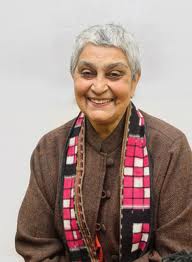Gayatri Chakavorty Spivak revives debate about India's subalterns
 Jaipur, Jan 26 : Leading international feminist philosopher, teacher of English and cultural theorist Gayatri Chakravorty Spivak has been trying to decode the soul of the subaltern in the villages of her home state of West Bengal in India for more than 30-odd years since she wrote her iconic essay, "Can the Subaltern Speak". Chakravorty argues that the subalterns - according to the military parlance - are a tribe that takes orders in an India that still battles class apartheid.
Jaipur, Jan 26 : Leading international feminist philosopher, teacher of English and cultural theorist Gayatri Chakravorty Spivak has been trying to decode the soul of the subaltern in the villages of her home state of West Bengal in India for more than 30-odd years since she wrote her iconic essay, "Can the Subaltern Speak". Chakravorty argues that the subalterns - according to the military parlance - are a tribe that takes orders in an India that still battles class apartheid.
"They (subalterns) are plain living, high thinking beings in my home state - the only subalterns I can approach. When I got to the subalterns and told them about my recent Kyoto Prize In Arts and Philosophy, they did not know. I will put that essay aside for another time," said Spivak, a professor at Columbia University, where she is a founding member of the school's Institute for Comparative Literature and Society.
The 71-year-old philosopher is known for her contemporary cultural and critical theories to challenge the "legacies of colonialism", inspired by de-constructivism, gender and egalitarian politics.
She often engages with the cultural texts of the marginalized - the new immigrant, working class, women and other subaltern groups - and explores how they relate to culture and literature. She is only Indian woman to be honoured with the University professor's post.
Addressing a literary discourse, "Rogues, Reviewers and Critiques", at the Jaipur Literature Festival, Spivak said after writing the essay "Can the Subaltern Speak", she was hailed as kind of expert on French deconstruction. "I had this autobiographical moment that people have when go abroad. I tried to think through my Indianness I thought I would question my French masters," Spivak said with her usual irreverence, for which she has been described by the New York Times as "difficult to understand".
In a more auto-critical way, there is a class apartheid in India that is encouraging the authorities to push a culture of rape and atrocities, Spivak said.
Beside teaching English at Columbia, the Kolkata-born Spivak is steering a silent revolution in a small rural swathe on the West Bengal-Jharkhand border. She is advising the local people, mostly marginalized ethnic communities, to green their fallow land and engage with literacy.
Spivak has signed up 72 people and is helping them cultivate wheat, mustard and potatoes, supported by the Taraknath Das Foundation, a local trust.
"I am an old Socialist. I believe in the state. I think at the lowest level of the civil society in West Bengal - in the rank of the block development officers - there is idealism," Spivak said.
In 1997, Spivak founded the Pares Chandra Chakravorty Memorial Literacy Project Inc, a not-for-profit to provide primary education to poor children to enable them to enter the mainstream education system. The project is named after her father. "In my schools, one of the huge problems is that they know only their own little circle on the Jharkhand border. They are the landless illiterates where the post-colonial is absent," she said.
Spivak says she counters the shrinking possibility of science education in rural schools by teaching them demical poetry and instilling curiosity about "math and science".
"Primary school teachers do not care," Spivak said.(IANS)